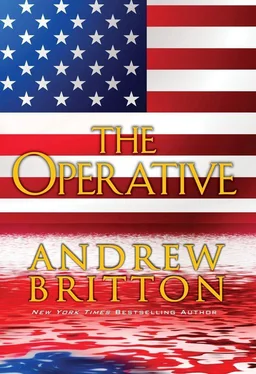Andrew Britton - The Operative
Здесь есть возможность читать онлайн «Andrew Britton - The Operative» весь текст электронной книги совершенно бесплатно (целиком полную версию без сокращений). В некоторых случаях можно слушать аудио, скачать через торрент в формате fb2 и присутствует краткое содержание. Жанр: Триллер, на английском языке. Описание произведения, (предисловие) а так же отзывы посетителей доступны на портале библиотеки ЛибКат.
- Название:The Operative
- Автор:
- Жанр:
- Год:неизвестен
- ISBN:нет данных
- Рейтинг книги:5 / 5. Голосов: 1
-
Избранное:Добавить в избранное
- Отзывы:
-
Ваша оценка:
- 100
- 1
- 2
- 3
- 4
- 5
The Operative: краткое содержание, описание и аннотация
Предлагаем к чтению аннотацию, описание, краткое содержание или предисловие (зависит от того, что написал сам автор книги «The Operative»). Если вы не нашли необходимую информацию о книге — напишите в комментариях, мы постараемся отыскать её.
The Operative — читать онлайн бесплатно полную книгу (весь текст) целиком
Ниже представлен текст книги, разбитый по страницам. Система сохранения места последней прочитанной страницы, позволяет с удобством читать онлайн бесплатно книгу «The Operative», без необходимости каждый раз заново искать на чём Вы остановились. Поставьте закладку, и сможете в любой момент перейти на страницу, на которой закончили чтение.
Интервал:
Закладка:
“No, I’m glad,” Kealey said. The cabbie was a young African American with an accent that sounded like Arkansas. Kealey gave him the address.
“Courtesy call?” the driver asked as he pulled away.
“Something like that,” Kealey responded.
“Probably a lot of that today,” the driver remarked.
“Yeah,” Kealey replied.
People were always friendlier in a crisis, wanting to make a connection. On the way over the driver had been too preoccupied with negotiating the streets blocked off with police vehicles to do more than mutter unhappily about the detours. D.C. cabbies were paid by the sector, not the mileage, and he was burning a lot of extra gas.
Kealey didn’t want to be rude, but he was too tired, too preoccupied to chat. He sat there, acutely aware now of the odors. That bothered him. He still had the old instincts for combat-those never left, even if the joints stiffened a little-but Kealey realized he was definitely out of practice. He hadn’t noticed the smells until Harper said something. That was the kind of slipup that could get someone killed in the field. He had always been alert to that after meeting a source overseas who smoked a distinctive tobacco or served him food that stayed on the breath for hours. Having Handi Wipes and flavored gum in his pocket was as important as having his passport and balisong.
His eyelids drooped as he sat there. The streetlights became smears; the outside world dreamlike. He just now understood what Harper had meant but hadn’t quite been able to articulate: since 2001 life itself had seemed unreal. Attacks or the threat of them. Anthrax in envelopes. Constant war.
Might as well call it what it is, he thought in his strangely lucid state. World War III on a slow burn.
Each time one of these events happened, here or in Madrid, London, Israel, Kealey privately hoped it would be the tipping point, the event that caused the globe to scream, “Enough!” There had been another white paper, one prepared by the Department of Defense, called Operation Tripod. It was named for a code word ascribed to the theoretical next world war. The precis-which itself ran seventy-four pages, just one one-hundredth of the document’s entire length-described unprecedented bombing runs around Middle Eastern oil facilities and pipelines to cut them off, followed by a massive airdrop of personnel and materiel to protect them and the construction of secure spans to get the oil out. The idea was that without petrodollars the enemy would starve. Starving, he would be forced to attack for supplies. Attacking, he would be cut down. The most radical part of the proposal was the section called Dewdrop. Radical or fence-straddling regimes that did not instantly fall in line, from Iran to Pakistan, would have their capitals razed by MOABs, Massive Ordnance Air Blasts, bombs that delivered the destructive force of the smallest nuclear devices but without the radiation.
A horrible scenario with countless innocent casualties, yes, Kealey reflected. But worth the price for normalcy, of an end to the Dark Ages nipping at the world’s extremities?
He didn’t know. And, fortunately, it wasn’t his decision to make.
And as he was thinking about that, his phone beeped. He checked the text message and frowned.
“Driver,” he said, “I’ve got a change of plans.”
“Yes, sir?”
“Take me to Lafayette Square, please.”
CHAPTER 17
NEW YORK, NEW YORK
“Hello, Yasmin.”
The soft voice, speaking Arabic, came from all around her. The soft voice, speaking Arabic, came from all around her. There were probably speakers nearby.
Clever, she had to admit. The blinding light her captors had turned on forced her to close her eyes, to pay attention.
“As you may have realized, there is a marble in the pocket of your blouse,” the voice went on. “We will release your left wrist from the restraint. You are then going to remove the marble and hold it in your left hand. You will close your fingers tightly around it. You are to squeeze the marble. If you relax your hand, my voice will be replaced with a less pleasant sound and we will have to begin again. Do you understand?”
“I do,” she said. For now, this was one of those plan-three responses to captivity: in the absence of any other option, pretend to cooperate.
There was a low hum and a snap. Her restraints were electromagnetic. Her left wrist had just been released. She reached for the marble and placed it in her left hand.
“You are not to speak unless a question is asked. Do you understand?”
“Yes,” she said.
“The light will be dimmed. You will keep your eyes closed.”
The bright red-orange hue of her eyelids darkened to a burnt sienna and then to deep brown.
“We are going to give you a series of instructions. If you fail to obey any of them, we will know.”
There was a long pause. When the voice returned, it was softer. Nearer, as though there were headphones a few centimeters from her ears.
“You are to tell us the first thing that comes to your mind,” the voice said. “Do not open your eyes. Do not think about your answer. Give us an immediate response. Do you understand?”
“Yes.”
There was another pause. When she heard the voice again, it was a little softer, a little nearer.
“Imagine that you are lying someplace. Where are you?”
“On a beach,” she replied.
“Imagine you turn to your left. What do you see?”
“The ocean.”
“What color is the water?”
“Blue.”
“Clear?”
“Yes.”
“Calm?”
“Yes.”
“What do you smell?”
“Salt in the air.”
“What else?”
“A moldy piece of wood.”
“Where is it?”
“At my feet. From a boat. An old boat.”
“Is it near the water?”
“Yes. Partly buried in the sand.”
“You turn to your right. What do you see?”
“A cliff.”
“Look up the cliff. What do you see?”
“A fortress.”
“Is it yours?”
“Yes.”
“Imagine you are standing beside it. What do you see?”
“A great wooden door.”
“Is it windy?”
“Yes. Up here.”
“Are the skies clear?”
“Perfectly.”
“Do you wish to enter?”
“Yes.”
“What do you say?”
“ ‘Guard, let me in.’ ”
“The guard asks, ‘Who are you?’ What do you answer?”
“I tell him that I am Princess Yasmin,” she said.
“You enter,” the voice told her. “What do you see directly in front of you?”
“My father.” She smiled. “The king.”
“He embraces you. How do you feel?”
“Wonderful.”
“What does he say to you?”
“ ‘Did you enjoy the beach?’ ”
“What do you tell him?”
“ ‘Very much, Father…’ ”
Two men and a woman were watching Yasmin on a monitor. The forty-two-inch LED screen sat on a glass-topped desk against a bare wall. A third man sat in a converted bathroom at the far end of the room. He was watching the same image on a laptop. A translation program was running the exhange in English along the left side of the screen with just a two-second delay. The room they were in was less than 300 square feet, with white walls and a bank of windows that looked out on the Hudson River thirty-six floors below. The glass was double thick as a buffer against street noise from the West Side Highway. The room on the laptop was a third that size, with only a gurney and an attendant. The big man was standing off in the shadows, well behind the gurney.
One of the men, Franklin May, was assistant director of the FBI’s Directorate of Intelligence. He did not know who the subject really was; a volunteer from NYU, born in New Delhi, raped as a child, he was told. The other, Alexander Hunt, was assistant director of the New York field office. He knew exactly who was on the table. May was sipping black coffee, and Hunt stood beside him with his arms crossed.
Читать дальшеИнтервал:
Закладка:
Похожие книги на «The Operative»
Представляем Вашему вниманию похожие книги на «The Operative» списком для выбора. Мы отобрали схожую по названию и смыслу литературу в надежде предоставить читателям больше вариантов отыскать новые, интересные, ещё непрочитанные произведения.
Обсуждение, отзывы о книге «The Operative» и просто собственные мнения читателей. Оставьте ваши комментарии, напишите, что Вы думаете о произведении, его смысле или главных героях. Укажите что конкретно понравилось, а что нет, и почему Вы так считаете.












